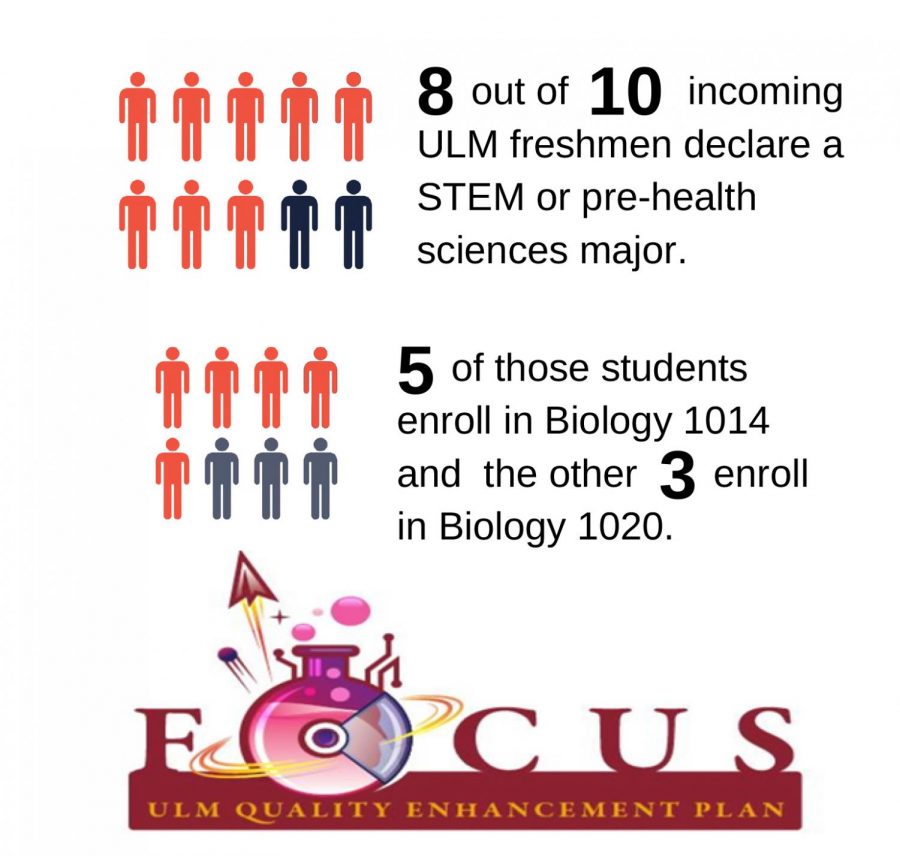Quality Enhancement Plan to change Biology
It’s that time of the decade when ULM needs to focus their energies extra hard into creating a better learning environment through what’s called a Quality Enhancement Plan (QEP).
Every 10 years, the Southern Association for Colleges and Schools Commission on Colleges (SACSCOC), requires universities to reaffirm their accreditation.
Every university develops a QEP as part of the reaffirmation of accreditation. The QEP is meant to enhance student learning in a specific area, and it should be centered around the university’s mission and vision.
ULM’s QEP this year is “FOCUS on Biology” which was created by a planning committee of students, faculty and staff. FOCUS stands for formulate, observe, communicate, use and synthesize.
It will implement a curriculum change in two gateway biology courses- Biology 1014, Fundamentals of Anatomy and Physiology I, and Biology 1020, Principles of Biology.
Looking at institutional data, these two classes have the potential to have the biggest impact on our campus. However, the curriculum change won’t change the lecture and labs, just add onto the understanding of the lecture material.
“The students will just come to a FOCUS section once a week with a teacher, a graduate assistant and hopefully some peer mentors who have been successful in the class. Activities that demonstrate concepts such as mitosis or photosynthesis will be completed so that students can learn them at a deeper level,” said Mallory Benedetto, the QEP coordinator and biology instructor.
These FOCUS groups will take place every week, outside of class. This model has been partially based on the Supplemental Instruction model already offered here at ULM and demonstrated to improve performance in students who participate.
If approved, the first FOCUS sessions will be implemented in BIOL 1020 starting in spring 2020. In fall 2020, all sections of both BIOL 1020 and BIOL 1014 will have FOCUS sessions.
This will hopefully increase the success rates and thinking skills for students in these classes so that the success in upper-level biology classes will improve and not be as difficult as it is now for many students.
“Meteorology, astronomy, geology, physics and chemistry-I love all of those. In biology, however, I had to fight for a low ‘B.’ I have no idea why biology is so much different than every single other branch of science, but I had to fight a lot harder for a grade in a freshman biology class than even upper level classes in the other sciences,” said Greg Sova, a senior atmospheric science major.
“During the process of implementing this quality enhancement plan, we will continue to evaluate the effectiveness of the FOCUS sessions through a variety of methods. We will quantitatively measure critical thinking and discipline specific knowledge using a proven critical thinking test developed at Tennessee Tech called the CAT Test and through locally developed diagnostic questions that will be embedded on the final exam of each section of the two courses,” said Anne Case-Hanks, the School of Sciences director.
Case-Hanks also said, “We will also gather qualitative data through post-mortem focus sessions, where we will get information from students, faculty and others involved on what went well, what should be changed and other ideas to continually improve.”
SACSCOC is the regional body that accredits degree-granting higher education institutions in the southern states of the U.S. The Commission’s mission is to enhance educational quality throughout the south and make colleges more effect by enforcing standards that address the needs of society and students.
Accreditation by SACSCOC signifies three things. The first is that the institution has a mission appropriate to higher education. The second is that the institution has resources, programs and services sufficient to accomplish and sustain that mission.
The third thing is that the institution maintains clearly specified educational objectives that are consistent with its mission and appropriate to the degrees it offers and that indicate whether it is successful in achieving its stated objectives, according to the SACSCOC’s Principles of Accreditation Handbook.
Dr. Judy Fellows, the associate vice president for Academic Affairs, and Allison Thompson, the director of assessment, plan to demonstrate compliance with the SACSCOC’s 14 principles and 72 standards through almost 1,000 pages of narrative and additional electronic pages of evidence.
Fellows said faculty, staff, students and administrators across campus were important to the reaffirmation process.
“As ULM prepares for the reaffirmation committee, our work continues so that we can physically demonstrate the quality of our university. In March, we will have the opportunity to show that ULM meets the needs of our students and society and should be recommended for reaffirmation of accreditation,” said Fellows.
The opportunity Fellow mentions is an on-site campus visit which is required as part of the reaffirmation process. ULM’s accreditation visit will be March 18-21.
However, the final decision to grant reaffirmation of accreditation will be made by the SACSCOC Board of Trustees in Dec. 2019.








